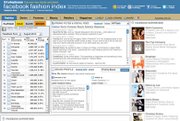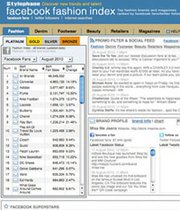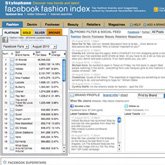Stylophane Tracks Brands' Social Status
Now fashion brands can see how they rank in the Web’s largest popularity contest.
San Francisco–based online-marketing firm Stylophane’s Facebook Fashion Index (www.stylophane.com/fbi) tracks and ranks a brand’s Facebook fan base and is updated daily. The FBI tracks both fashion and beauty brands and breaks its rankings into five style categories: fashion, denim, beauty, footwear and fashion publications.
The FBI is a free service and aggregates the Facebook and Twitter feeds of more than 1,500 style brands as well as fashion publications. Brands with the most followers reach platinum status, while others are listed under gold, silver and bronze banners.
Stylophane—which has been generating e-commerce solutions and online-marketing campaigns for companies such as Miss Me, True Religion, Ben Sherman and Michael Stars since 2002—launched the FBI in February 2010 with a goal to be a single source to track hundreds of brands’ social activities. Stylophane also operates a similar index that tracks brands’ search-engine rankings.
“I realized that the number of Facebook fans or ’likes’ served as an indicator of market growth in the fashion industry—allowing me to track fashion trends at the grass-roots level,” said Alex Mendoza, partner of Stylophane, which he started with his wife, Marlena Albin. Mendoza’s first foray into online was as the founder and creator of contemporary fashion and streetwear e-commerce site Karmaloop.com.
After the initial research of the social presence of more than 1,000 brands, Mendoza was surprised to find that 60 percent didn’t even maintain a Facebook page. Since releasing the FBI, Mendoza says, brands have taken notice and have taken steps to grow their fan base as much as 10 times, which speaks to the growing power of social media.
“Facebook itself is always morphing, so it’s important to know who’s staying on top and what’s going on in fashion,” Mendoza said.
Acting almost like a stock market ticker for social-networking activity, the FBI can be followed by both industry watchers and consumers alike. For consumers, there is an area to keep track of any special promotions or deals offered through brands’ Facebook and Twitter pages.
Mendoza says the FBI can be utilized as a social-marketing tool for the apparel industry—for buyers, marketers and retailers.
If anything, the FBI can encourage a brand to rethink and re-strategize its online branding. Mendoza said brands have been responsive, and the “Facebook superstars” are motivated to see who’s aggressively campaigning through social media.
A prime example would be under-the-radar, New York–based vintage line What Goes Around Comes Around, which boasts more than 650,000 Facebook fans as of August 2010 and ranks higher than more well-known brands such as Levi’s, Quiksilver, Diesel and Calvin Klein.
























